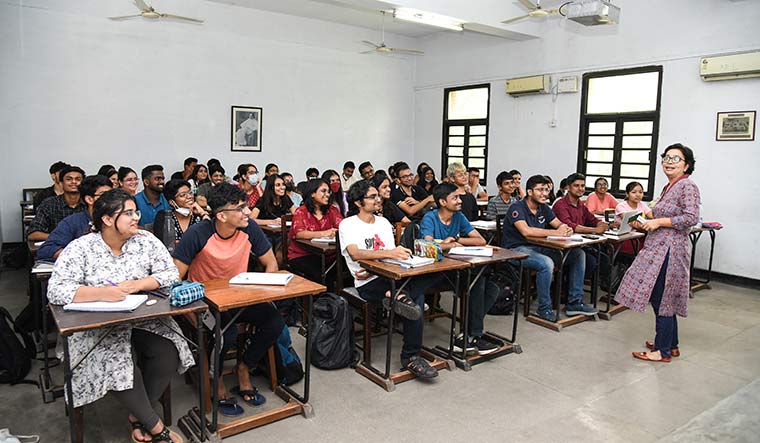K. KASTURIRANGAN, HEAD of the drafting committee of the National Education Policy (NEP) 2020, told this correspondent a year ago that the new policy was not about tweaking the existing educational system, but transforming it. “Higher education will become much more student-centric and will focus on building 21st century skills. Our youth and adults will have the opportunity to keep learning throughout their lives to keep pace with a fast-changing world,” he said. Two years after NEP was announced, many colleges and universities are ready to implement it from this academic year.
Experts and educationists stress that the implementation of NEP is more important than its planning and design. Delhi University Vice Chancellor Yogesh Singh said DU’s four-year undergraduate curriculum was ready. “We will focus on a multidisciplinary, student-centric approach where students are free to decide what they want to study. We are implementing it from this academic year.”
The National Assessment and Accreditation Council (NAAC) is changing its manual as per NEP provisions. NAAC Director S.C. Sharma said implementing NEP was a matter of perception and understanding. “The norms are flexible and can be adopted easily by educational institutions. We have also been changing our manual in accordance with NEP.”
Experts, however, point out that the implementation is not going to be easy as India has one of the largest and diverse education systems in the world. “There are about 1,100 universities and 43,000 colleges. The diversity in the institutional structure of the colleges is huge, with some being affiliated, some autonomous, some with special minority status, etc. Each of these education typologies have specific governing structures for decision making,” said Ali Raza Moosvi, vice chancellor, Khaja Bandanawaz University in Karnataka. “Then there is the fact that education is on the concurrent list, which means that both the Central and state governments have a say. ”
The NEP document was in the public domain and many rounds of consultations were sought from stakeholders, planners, academicians and teachers. “The existing structures do not allow for practical application to the extent that the policy envisages. Academic freedom to faculty, evenly spread workload or the option to step outside the confines of one’s discipline are ideas that are still far away. Then there is always the ‘holy-grail’ of academic autonomy,” added Moosvi. He also warned about the inherent political bias that often happened with policy pronouncements. “Opposition-ruled states do not want to fully implement NEP, while [NDA-run] states rush in with compliance. Both approaches seem to miss the point that any new idea needs time to germinate and grow and undue haste or delay reduces it to mere politics,” said Moosvi.
Despite evident challenges, institutions are ready to welcome the fresh batch of students, presumably to an entirely new system. “It is going to be a roller-coaster, but surely an exciting ride that will irrevocably change the educational landscape,” said Pratibha Jolly, academic consultant, NAAC, and former principal, Miranda House.
As the D-Day approaches, educationists have mixed feelings. Rajendra D. Shinde, principal of St Xavier’s College (Autonomous), Mumbai, spoke about the steps initiated by his institution. “We have been reading in newspapers that high-level committees have been formed at the ministry and at the university level to decide the mode and the way to implement NEP. We, at Xavier’s, have had four webinars, including one international conference, on higher education where NEP was discussed. We also had a workshop on its implementation,” he said. “Many colleges are waiting for government directives.”
Jolly said top-ranked institutions were well-geared to usher in the NEP changes. “The system is plunging headlong into uncharted territory. Implementation will rest primarily on the resilience and agility of the institutional communities and their capacity to adapt and to adopt innovative practices.”


